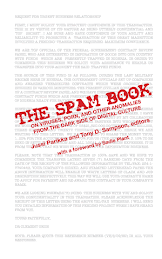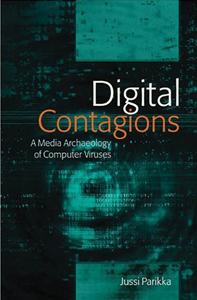Following Steven Shaviro’s and others’ lead, here is a brief summary of my summer’s reading list. Of course, this is more about good intensions, but in any way, represents some of the stuff I need to be catching up with. A painful reminder of things that should have been read ages ago. So read this post as masochism of sorts.
Karen Barad, Meeting the Universe Halfway (Duke 2007)
- such a crucial thinker for neomaterialist cultural analysis, one cannot neglect this book that ties Bohr’s quantum physics with feminist theory. She comes up with such great, and useful concepts as “agential realism” which I believe give tools to both science studies as well as posthuman theory. To quote: “… matter as a dynamic and shifting entanglement of relations, rather than a property of things.” (35).
Joanna Zylinska, Bioethics in the Age of New Media (MIT 2009)
- two reasons: going to Sussex Biodigital Lives conference soon, and wanted to catch up what Zylinska is saying in her new book; then doing a review of it for Leonardo Reviews. Zylinska offers a deeply ontologically rooted ideas concerning bioethics, and extends its regime from only medicine and the biodigital to such practices as blogging and phenomena such as make-up shows. Biopolitics is a parallel theme to bioethics, claims the book. Interestingly, the book tries to come up with Levinas something new, although claiming sympathy to Deleuzian approaches. Indeed, it seems that she shares a lot in this sense with some of Eugene Thacker’s Biomedia-ideas.
Eugene Thacker, Biomedia (Minnesota, 2004)
- a book I should have read a long time ago, but now trying to scan it through in its entirety, again partly because of the Sussex event. I think Thacker’s idea of biomedia as “enabling certain types of data to be mobilized across different media” – i.e. as a concept of mediation that does not lose sight of the material basis of such encodings and decodings is great also for a wider reconsideration of the agenda of media studies (media studies as the potentially key discipline to understand various exchanges happening across scales from science and technology to visual culture and for example science fiction).
Axel Volmar (ed.), Zeitkritische Medien (Kadmos 2009)
- a book that sums up many of the interest in Berlin media studies concerning “time critical media.” It looks like an excellent book that argues for the centrality of time as both an epistemological perspective for media studies and as an ontologically organizing principle for modern technical media culture. This is the stuff what Wolfgang Ernst is always on about (and for a good reason), and where the macrotemporal durations inspected by media archaeology could find a new ground in microtemporal modulations of technical media.
Charles Stross, Accelerando
- His Atrocity Archives was a bit of a disappointment (except for the excellent afterwords), but this one, a gift and a recommendation from Michael Goddard, is much more promising after 150 pages. Much more about political economy of ultra-technological culture. And hey, it’s got lobsters uploaded to computer networks, what more could you expect? I just wish I had read the lobster bits before submitting my Insect Media book to the publisher.
Axel Bruns, Blogs, Wikipedia, Second Life, and Beyond (Peter Lang, 2008)
- well, this is just one of the books you need to read to keep up with relevant social media stuff. Probably the best summarizing book on social media topics, something I should have digested a while ago.
Erin Manning, Relationscapes (MIT 2009)
- as with Barad, this connects with my interests in neomaterialist modes of analysing culture and arts. I have read some chapters, but I will try to go through the remaining as well. It’s an important book, and hopefully provides such a tool box that helps to articulate themes of event, relationality and movement not only in terms of dancing bodies but also e.g. such non-human topics I am working on as media ecologies. Having said that, we are just finishing an article on contemporary dance, movement and biopolitics, and it touches closely Manning’s themes. The article is on Tero Saarinen’s magnificent collaboration with Marita Liulia: Hunt.
Sven Spieker, The Big Archive (MIT Press)
- actually, just finished reading this but wanted to include it here because I liked it so much. In the midst of finishing the book on Media Archaeology, this spurred new ideas and summed some thoughts I also had. It focuses on the appropriation of the archive and other bureaucratic modes of data management with artistic methodologies, placing a lot of emphasis on early 20th century avant-garde. To my taste, it is a really good book not only on the artistic projects but on the “archival principle” of modernity in general. It touches on some of the key questions of 19th century archive and its change during 20th century. Where it stops is the digital; would have been interesting to look at the notion of the archive/database in the digital networked era through e.g. net art pieces.
Then there are other stuff that I really hope I can glance through, such as Michelle Hennings Museums, Media and Cultural Theory (in connection to a funding bid we have submitted with Robin Boast). Also, bubbling under so to speak is a something I ordered, by Gherasim Luca, something I really look forward as my holiday treat, but more on that later….
Wednesday, 1 July 2009
Subscribe to:
Post Comments (Atom)








No comments:
Post a Comment